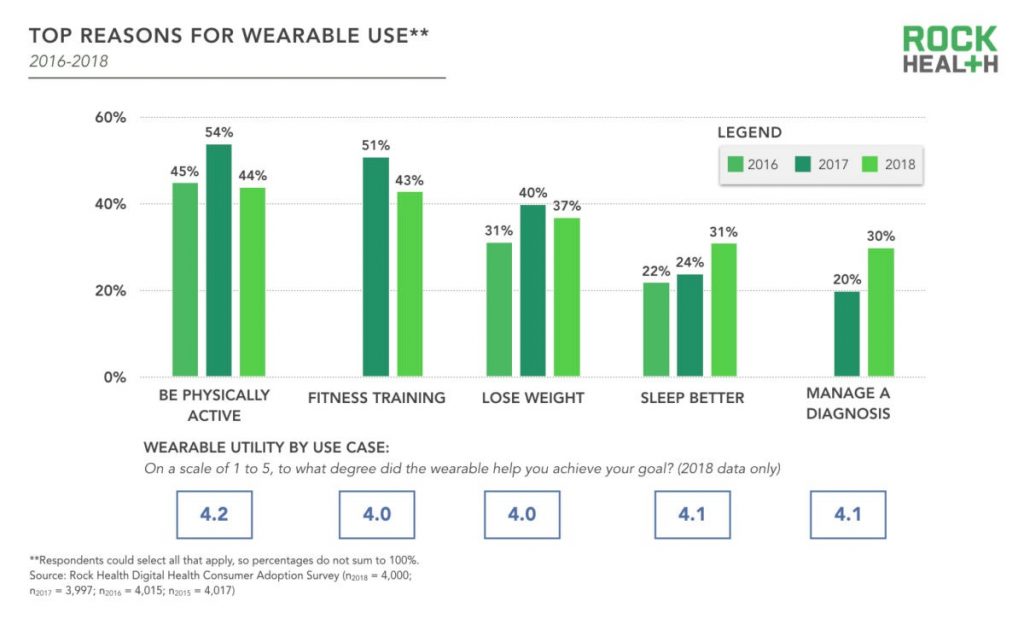Seeking health information online along with researching other patients’ perspectives on doctors are now as common as booking dinner reservations and reading restaurant reviews, based on Rock Health’s latest health consumer survey, Beyond Wellness for the Healthy: Digital Health Consumer Adoption 2018.
![]() Rock Health has gauged consumes’ digital health adoption fo a few years, showing year-on-year growth for “Googling” health information, seeking peer patients’ physician and hospital reviews, tracking activity, donning wearable tech, and engaging in live telehealth consultations with providers, as the first chart shows.
Rock Health has gauged consumes’ digital health adoption fo a few years, showing year-on-year growth for “Googling” health information, seeking peer patients’ physician and hospital reviews, tracking activity, donning wearable tech, and engaging in live telehealth consultations with providers, as the first chart shows.
The growth of tracking and wearable tech is moving toward more medical applications beyond fitness and wellness, Rock Health found. This is due to more tools gathering more clinical evidence to show effectiveness and validity. Some innovators have invested the time and money to undergo FDA clearance; some have collaborated with health care providers and researchers to build evidence cases and calculate cost-effectiveness or ROI for their use.
 While fitness training and bolstering physical activity have lost traction by ten points each, the second bar chart illustrates, managing a diagnosis and sleeping better have gained consumer traction. Rock Health analysts expect that wearable tech use will continue to grow with more use cases for remote health monitoring coupled with consumers and patients being incentivized to continue their use.
While fitness training and bolstering physical activity have lost traction by ten points each, the second bar chart illustrates, managing a diagnosis and sleeping better have gained consumer traction. Rock Health analysts expect that wearable tech use will continue to grow with more use cases for remote health monitoring coupled with consumers and patients being incentivized to continue their use.
Telehealth adoption also grew from 2017 to 2018. I discussed the supply and demand sides of telehealth converging based on my conversations at HIMSS last week (my observation: that telehealth is morphing into, simply, health care workflow). The biggest growth, Rock Health found, was for live phone telehealth, with 64% of respondents using this channel, followed by email and text. Live video use roughly doubled, from 19% in 2017 to 34% in 2018.
Life video telehealth adoption was most prominent among younger patients, 18 to 34, living in urban geographies.
Trust continues to be the most important precursor to health engagement, we learned in the Edelman Health Engagement Barometer, and Rock Health notes this to still be the case. “My physician” is the most trusted data steward, with 72% of consumers willing to share health data with “their” personal doctors. Tech companies? Only 11% of consumers said in 2018 that they’d be willing to share health data with them. Within that 11% marginal interest, the top-ranked tech companies for sharing were Google, Amazon, and Microsoft, each with over 50% of interest; Apple garnered 49% of that 11% trusting tech. FYI, Facebook had 40%, and IBM, 34%.
Physicians increasingly understand and appreciate the trust equity they’ve earned with patients. To continue to nurture that precious asset, JAMA published this article last week on A Framework for Increasing Trust Between Patients and the Organizations That Care for Them. The key takeaway: “No single approach will ensure, maintain, or rebuild trust. There is important work to do by payers, boards, senior management, middle management, and clinicians. The key themes that emerged from this work group included commitment to meeting patients’ needs as the core of organizational culture; measurement of patients’ experience and clinician engagement; creation of systems of accountability with financial and nonfinancial incentives; building of effective teams; cultivation of communication and relationship skills; and inclusion of patients in all phases of this work.”
 Health Populi’s Hot Points: The health consumer conundrum on trust and “my” health/care data in our current world is that so much health-related data isn’t covered by HIPAA or in the medical claim or EHR. Some of the most impactful and insightful consumer information is mashed up from retail receipts, fast food check-ins, and mobile phone use and GPS sitings.
Health Populi’s Hot Points: The health consumer conundrum on trust and “my” health/care data in our current world is that so much health-related data isn’t covered by HIPAA or in the medical claim or EHR. Some of the most impactful and insightful consumer information is mashed up from retail receipts, fast food check-ins, and mobile phone use and GPS sitings.
At HIMSS19 last week, we noted a growing cadre of service organizations like Acxiom, LexisNexis, and TransUnion who play various roles in profiling patients as consumers and payors. Rock Health is right to note consumers’ concerns about privacy and security of “my” data in the post-Facebook/Cambridge Analytica environment. I wrote about this exactly one year ago after HIMSS18…forecasting this point on the minds of health consumers.
In the U.S., patients-as-consumers-as-payors aren’t well served by HIPAA, which was written in the pre-smartphone, medical breach era.
I’m encouraged to see that Americans are growing in knowledge and awareness of privacy threats and the value of personal information demonstrated by this last graph from the Rock Health survey. Awareness of health data privacy is an important aspect of health literacy. Will patients-as-voters in the USA express their demands for better privacy protections as health citizens? That is my yet-to-be-answered question.
The post Open Table for Health: Patients Are Online For Health Search and Physician Reviews appeared first on HealthPopuli.com.
Open Table for Health: Patients Are Online For Health Search and Physician Reviews posted first on http://dentistfortworth.blogspot.com
No comments:
Post a Comment